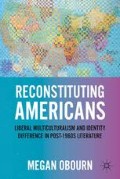Abstract
Since the civil rights and other new social movements of the mid-to late twentieth century, modes of US citizenship1 have shifted to incorporate a politicized understanding of social identities. From this shift emerged what has come to be known as a politics of multicultur-alism. Though in academia there has been a push to move “beyond” the logic of multicultural identity politics—to global, cosmopolitan, or postnational readings—our everyday understandings of American citizenship remain steeped in a nationally oriented politics of identity.2 This politics follows a logic of difference in sameness. It is simultaneously multiculturalist and liberal individualist, as these ideologies have been defined by the social and political history of the United States. Reconstituting Americans makes the case that we should stay with the questions raised by multiculturalism, that such questions were never adequately answered, and that shifting the framework away from the national does not so much answer outstanding questions and paradoxes as it allows us to cover over them in the push to escape their irritating persistence in every aspect of US cultural and political life. This book looks at literary representations of post-new social movement US citizenship that reveal to their readers the inherent contradictions of a liberal multicultural ideology that celebrates the value of “difference” and “recognition” while simultaneously limiting the ways in which persons marked as socially “different” can be represented and addressed as citizens.3
Access this chapter
Tax calculation will be finalised at checkout
Purchases are for personal use only
Preview
Unable to display preview. Download preview PDF.
Notes
Bernard Murchland, “The Rigors of Citizenship,” The Review of Politics 59, no. 1 (1997): 127.
David Hollinger, Postethnic America: Beyond Multiculturalism (New York: Basic Books, 1995), 1, 4.
Evelyn Glenn, “Citizenship and Inequality: Historical and Global Perspectives,” Social Problems 47, no. 1 (2000): 1.
Louis Hartz’s The Liberal Tradition in America (New York: Harcourt, Brace, 1955)
Bernard Bailyn (The Ideological Origins of the American Revolution [Cambridge, MA: Belknap Press, 1967])
J.G.A. Pocock (The Machiavellian Moment: Florentine Political Thought and the Atlantic Republican Tradition [Princeton, NJ: Princeton University Press, 1975])
James P. Young’s Reconsidering American Liberalism: The Troubled Odyssey of the Liberal Idea (Boulder, CO: Westview Press, 1996)
Evelyn Glenn’s “Citizenship and Inequality,” and David F. Eric-son’s The Shaping of American Liberalism: The Debates over Ratification, Nullification and Slavery (Chicago: University of Chicago Press, 1993)
Ayelet Shachar, “On Citizenship and Multicultural Vulnerability,” Political Theory 28, no. 1 (February 2000): 66.
John Rawls, A Theory of Justice (Cambridge, MA: Harvard University Press, 1971), 136–42.
Will Kymlicka, Politics in the Vernacular: Nationalism, Multicultur-alism, and Citizenship (New York: Oxford University Press, 2001), 22–23.
Will Kymlicka, Multicultural Citizenship (New York: Oxford University Press, 1995), particularly chapters 4 and 5.
Brian Barry, Culture and Equality: An Egalitarian Critique of Multiculturalism (Cambridge, MA: Harvard University Press, 2001), 7.
Charles Taylor, “The Politics of Recognition” in Multiculturalism: Examining the Politics of Recognition, ed. Amy Gutmann (Princeton, NJ: Princeton University Press, 1994), 25.
Nancy Fraser, “Recognition or Redistribution? A Critical Reading of Iris Young’s Justice and the Politics of Difference,” Journal of Political Philosophy 3, no. 2 (June 1995): 167.
Joan Scott, “Multiculturalism and the Politics of Identity,” October 61 (1992): 17.
Nikhil Pal Singh, Black is a Country: Race and the Unfinished Struggle for Democracy (Cambridge, MA: Harvard University Press, 2004), 41–42.
George Levine, “Reclaiming the Aesthetic” in Aesthetics and Ideology, ed. George Levine (New Brunswick, NJ: Rutgers University Press, 1994), 3.
Isobel Armstrong, The Radical Aesthetic (Maiden, MA: Blackwell, 2000), 40.
Christopher Castiglia and Russ Castronovo, “Preface: A ‘Hive of Subtlety’: Aesthetics and the End(s) of Cultural Studies,” American Literature 76, no. 3 (September 2004): 423.
Kusnir, “Ideology and Aesthetics in Literature,” in Ideology and Aesthetics in American Literature and Arts, ed. Jaroslav Kušnír (Stuttgart: Verlag, 2007), 7.
Vincent B. Leitch, William E. Cane, Laurie A. Finke, Barbara E. Johnson, John McGowan, and Jeffrey L. Williams, eds., The Norton Anthology of Theory and Criticism (New York: Norton, 2001), 499.
Wai Chee Dimock, “Aesthetics at the Limits of the Nation: Kant, Pound, and the Saturday Review,” American Literature 76, no. 3 (September 2004): 530.
Stanley Fish, Self-Consuming Artifacts: The Experience of Seventeenth Century Literature (Berkeley: University of California Press, 1972), xii.
Judith Butler, Antigone’s Claim: Kinship between Life and Death (New York: Columbia University Press, 2000);
Jean Wyatt, “Love’s Time and the Reader: Ethical Effects of Nachträglichkeit in Toni Morrison’s Love.” Narrative 16, no. 2 (May 2008): 195, 196.
Priscilla Wald, Constituting Americans: Cultural Anxiety and Narrative Form (Durham, NC: Duke University Press, 1995), 1.
Philip Fisher, Still the New World: American Literature in a Culture of Creative Destruction (Cambridge, MA: Harvard University Press, 1999), 52.
Herman Melville, Benito Cereno, in Billy Bud and Other Stories (New York: Penguin, 1986), 207.
James Kavanagh, “ ‘That Hive of Subtlety:’ Benito Cereno as a Critique of Ideology,” Bucknell Review: The Arts Society and Literature 29, no. 1 (1984): 127–57.
D.W. Winnicott, “The Fate of the Transitional Object,” in Psychoanalytic Explorations, eds. Clare Winnicott, Ray Shepherd, and Madeline Davis (Cambridge, MA: Harvard University Press, 1989), 57.
D.W. Winnicott, “The Use of an Object,‘” in Psychoanalytic Explorations, eds. Clare Winnicott, Ray Shepherd, and Madeline Davis (Cambridge, MA: Harvard University Press, 1989), 221.
Robert J.C. Young, Colonial Desire: Hybridity in Theory, Culture, and Race (London: Routledge, 1995), 19.
Copyright information
© 2011 Megan Obourn
About this chapter
Cite this chapter
Obourn, M. (2011). Introduction: The Liberal Multicultural Paradox and Aesthetics of Internal Distantiation. In: Reconstituting Americans. Palgrave Macmillan, New York. https://doi.org/10.1057/9780230339378_1
Download citation
DOI: https://doi.org/10.1057/9780230339378_1
Publisher Name: Palgrave Macmillan, New York
Print ISBN: 978-1-349-29437-4
Online ISBN: 978-0-230-33937-8
eBook Packages: Palgrave Literature CollectionLiterature, Cultural and Media Studies (R0)

